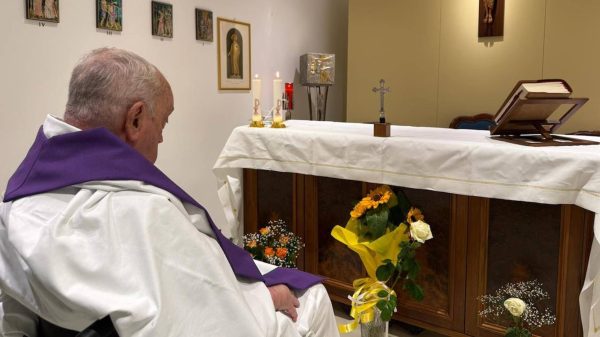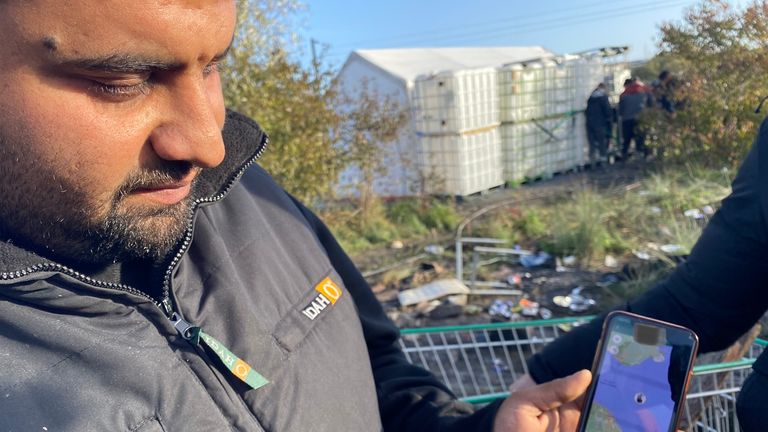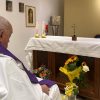Grande-Synthe’s migrant camp is always a great place to visit, but this time it seems particularly grim.
As he charges his phone, his foot sinks into the mud so deeply that it makes my skin itch. The camp’s road runs across the middle of the mud, and a puddle has become a lake.
As I speak with some of the residents, I learn that they keep a brazier lit by wood and hand gel.
Although it is dangerous, it serves a purpose. It is the place where people are able to prepare to travel to Britain.
You can meet a smuggler at this camp who will sell you a passage across the Channel. They will also tell you for a fee that they can fulfill your dream of reaching the English shore.
One year after the deaths of 31 people in a light dinghy at the Channel, the desire to cross the Channel seems unrestrained.
Ahmed, who is already trying to cross the Channel, meets us and tells us all about his experience. The evidence is on Ahmed’s phone – a map that shows that he was almost in English territorial waters at the time the engine on his boat failed.
If he had only kept going, his rescuers might have taken him to Kent instead of back to Northern France.
Rebaz has spent many months trekking from Kurdistan to get here. He made the difficult journey despite having his left leg amputated at the bottom. It was taken away while he was close to an airstrike in Iraq, he claims.
Rebaz believes NATO is to blame for his injury. However, Rebaz is determined to travel to Britain for “life is better there” and for the benefit of his children’s future.
When I ask him whether he is worried about the danger or the possibility of people being killed in the Channel, his response is to shrug and appear genuinely indifferent. He tells me, “I’m not afraid.” “Nobody is afraid. “I have to go. There is no other choice.”
That drive was what drove 33 people to board the ill-fated boat one year ago. Many perished, but only two survived. Twana Mamand Mohammed, who was 18, has not been found.
He was a keen athlete who loved Taekwondo as well as football. He had always wanted to leave Iraq and see Europe, and maybe become a professional footballer in the Premier League.
Zana, his brother, said that he was “no trouble” at all – at school, on the streets, and with his friends. He was, he stated, “the go to person in the family”.
Twana had previously texted his brother, to assure him that everything was fine, and that the boat was operating normally.
The engine eventually failed a bit later. Sky News obtained transcripts of text and phone conversations between the French emergency services and the boat crew. They paint a picture that shows chaos at sea and hesitation on land.
The boat crew called the French emergency line but no help was received.
They were then informed that they were in British coast waters and should call the UK authorities. The boat was then found in French waters.
It continued like this until hours later when the authorities passed the blame and the information was not shared between them. When the French were asked about the boat’s ability to take on water, they replied that it was “English water”.
Subscribe to Sky News Daily, where you can get your podcasts
The passengers were eventually rescued by the sea after hours of phoning for help that never came.
It was a fishing boat that raised the alarm after it saw bodies in the water.
Zana is currently in France trying to learn more about the circumstances of his brother’s suicide. He is still devastated by the tragedy, and bewildered at how desperate people could have been helped.
He says, “Because the incident occurred in the waters between two countries our loved ones contacted each country and requested assistance.” “But none of them offered any assistance.”
Continue reading:
English Channel Deaths: Since 31 people were killed in the tragedy, the government has ‘learned nothing.
Robert Jenrick, Immigration minister,’should resign’ over migrant hotel issues. Tory MP:
He said that he now advises people to not follow his brother’s lead; to avoid dangerous crossings and to think about their safety. He says that his advice is being ignored.
“Whoever you tell to not embark on this boat trip, they will say, “Whatever God has in store”
“So I tell them about the terrible journey of Twana, but this migration continues. It will continue.
He’s correct. Over the past year, the number of people crossing the Channel is on the rise. Around 44,000 people arrived in Britain by small boats since the November 2021 disaster.
It is evening in Dunkirk, and a procession makes its way through town. This is a memorial march to the 31 victims of the Holocaust.
The procession ends at the beach where victims’ names are read out. Hand-painted signs with their names are also displayed. Twana’s name, as well as all others, is listed. It is a list of mostly young lives that were cut short by the most horrific of circumstances.
It seemed at the time like a tragedy that would require change. In reality, however, the boats still leave, the smugglers still make a living, and the camps buzz with people.
As long as desperate people continue crossing the busiest shipping route in weak, fragile craft, another disaster seems grimly likely.





















